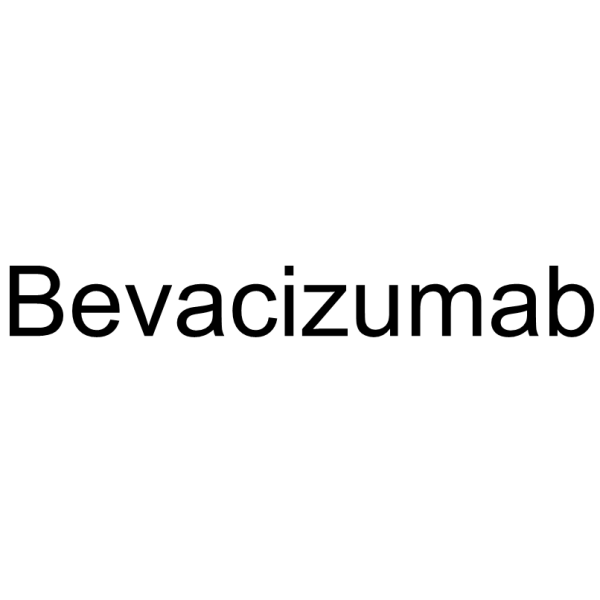Shopping Cart
- Remove All
 Your shopping cart is currently empty
Your shopping cart is currently empty

Bevacizumab, a humanized monoclonal antibody, specifically and with high affinity binds to all isoforms of VEGF-A.

| Pack Size | Price | Availability | Quantity |
|---|---|---|---|
| 1 mg | $129 | In Stock | |
| 2 mg | $212 | In Stock | |
| 5 mg | $396 | In Stock | |
| 10 mg | $589 | In Stock | |
| 25 mg | $943 | In Stock | |
| 50 mg | $1,280 | In Stock | |
| 100 mg | $1,720 | In Stock | |
| 200 mg | $2,330 | In Stock |
| Description | Bevacizumab, a humanized monoclonal antibody, specifically and with high affinity binds to all isoforms of VEGF-A. |
| In vitro | METHODS: Human lung cancer cells A549 were treated with Bevacizumab (1-25 µM) for 12-72 h. Cell proliferation was detected by CCK-8 assay. RESULTS: Bevacizumab treatment of A549 cells for 12 h showed mild inhibition of cell proliferation, but after 24 h showed significant induction of apoptosis in a dose-dependent manner. [1] METHODS: Human tumor cells AGS, Caco2 and HepG2/C3A were treated with Bevacizumab (5 ng/mL-100 µg/mL) for 48 h. Telomerase expression and activity were measured by semi-quantitative RT-PCR. RESULTS: Bevacizumab (5 ng/mL) increased hTERT mRNA levels in AGS by 35.2%, Caco2 by 62.0%, and HepG2/C3A by 21.8%. In contrast, Bevacizumab (100 µg/mL) increased hTERT mRNA levels in AGS by 42.3%, Caco2 by 94.1%, and HepG2/C3A by 52.5%. Thus, Bevacizumab significantly increased hTERT mRNA levels and telomerase activity in AGS, Caco2 and HepG2/C3A. [2] |
| In vivo | METHODS: To investigate antitumor activity, Bevacizumab (2-5 mg/kg) was injected intraperitoneally into nude mice bearing xenografts of human osteosarcoma cells 143B-RFP twice a week for 43 days. RESULTS: Bevacizumab exhibited potent anti-angiogenic activity in a nude mouse model of experimental osteosarcoma without affecting the incidence of lung metastases. [3] |
| Kinase Assay | The binding kinetics of Bevacizumab or FD006 to VEGF is measured using Bio-Layer Inter-Ferometry on Octet RED. The assay is conducted at 30°C in PBS buffer. Sensor tips are pre-wet for 15 mins in buffer immediately prior to use, and the microplates are filled with 200 μL per well of diluted samples (VEGF) or buffer and agitated at 1000 rpm. The anti-human IgG biosensor are pre-saturated with Bevacizumab or FD006 (10 μg/mL) and washed in buffer for 120 seconds, and then transferred to VEGF at concentrations of 10 μg/mL, 3 μg/mL and 1 μg/mL. The VEGF association and dissociation rates are measured for 5mins and 10mins, respectively. The Kinetics parameters (Kon and Koff) and affinities (KD) are calculated from a non-linear global fit using the Octet analysis software. Multiple independent measurements are performed[2]. |
| Cell Research | Human umbilical vein endothelial cells (HUVECs) (1×104 cells/100 μL/well) are seeded in 96-well plates and cultured at 37 for 14 h with Endothelial Cell Medium supplemented with 5% heat-inactivated FCS, 100 U/mL Penicillin, 100 U/mL Streptomycin, and endothelial cell growth supplement. After low-serum starvation overnight, cells are treated with different concentrations of FD006 or Bevacizumab which are pre-incubated with 10 ng/mL VEGF for 30 minutes and incubated at 37, 5% CO2 for 72 hours. Then, 10 μL CCK8 is added to each well and incubated for another 4 hours. The absorbance is measured by spectrophotometer at 450 nm to determine the cell viability[2]. |
| Molecular Weight | 146.53 kDa |
| Cas No. | 216974-75-3 |
| Relative Density. | no data available |
| Storage | store at low temperature | store at -20°C | Shipping with blue ice. |

Copyright © 2015-2025 TargetMol Chemicals Inc. All Rights Reserved.